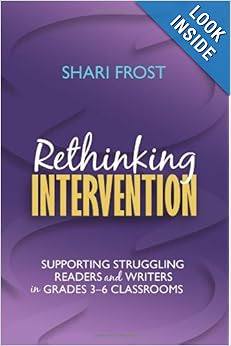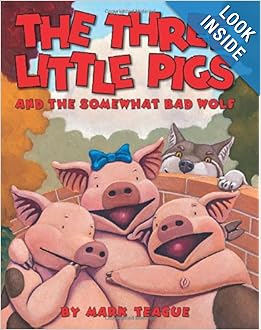We're into our third week of the second round of #nerdlution. Today's round-up at Michelle Haseltine's blog: One Grateful Teacher. Each Thursday participants will link up to share their progress.
Well, it's time for the #nerdlution check in. (Picture me with my head hanging down in defeat.) This week was parent-teacher conference week AND evaluation week so it's been a bit hard to find much extra time in my schedule. Additionally, I have taxes and FAFSA staring at me each day. As you can imagine, it's been a rough week to find extra minutes for reading. It was actually sometimes hard to find time to eat. OK, I always manage to find time to eat. I'm going to have to say I haven't really lived up to my goals this week, but I'm hoping I might be better able to find more reading time in the coming week.
This Week's Discoveries
A Book
Despite the time crunch, I did manage to read Rethinking Intervention: Supporting Struggling Readers and Writers in Grades 3-5 Classrooms by Shari Frost. This book published by Choice Literacy is one for classroom teachers, intervention specialists, and building intervention teams to consider as they work with students in need of extra support.
It's true that I currently teach first grade, but I found this book applicable to my classroom of young learners as well. Shari weaves stories of children, classroom teachers, and intervention specialists working together to support learners in their literacy journey. I appreciated her candor, thoughtful suggestions, and common sense approach.
Shari Frost begins by reminding us, "The most important component of a successful intervention program is a knowledgeable and responsive teacher who can make informed decisions based on students' reading writing behaviors." That's a lot of pressure! As a classroom teacher, Shari reminded me of the myriad of ways I can support learners across the day while still allowing much needed time for students to read, write, and collaborate with peers. She shared suggestions for supporting students in need of support in whole group learning, small group work, and individual conferences.
One of the hardest things for me to understand as a classroom teacher is the way students who need support are often pulled from classroom to classroom and work in interrupted periods of time across their day. Additionally they often lack the time to practice these new strategies and understandings in real reading and writing opportunities. I'm quite sure if we did this to our most independent learners they would find it quite challenging to keep up. Frost shares ways classroom teachers can utilize a workshop framework to provide high levels of support for literacy learners. She reminds us that often there are other students in the classroom who have similar needs.
When I taught Reading Recovery I learned the significance of intentional work to help students transition into the classroom. Frost shares ways for intervention teachers, classroom teachers, and other support staff to work together toward common goals that help the student to hear consistent messages across learning environments. Schools are busy with complicated schedules. Frost considers creative ways school communities have discovered to find time for collaboration, observation, and supporting colleagues as they work to find ways to strategically support students in need of intervention.
A Picture Book
If the book fair hadn't have rolled into our school this week I might not have discovered a good picture book to share, but it did. My students fell in love with The Three Little Pigs and the Somewhat Bad Wolf by Mark Teague. Several of the students purchased the book and insisted I read it. So, of course, I read it. They laughed over the antics of the Somewhat Bad Wolf and the choices of the pigs. In this story the three pigs are busy building their houses….or eating potato chips and drinking sody pop. Esmerelda, the sheep?, is always offering helpful advice. What happens when the wolf comes along to huff and puff? My class was still debating the true identify of the wolf after the book was finished.
A Post
Wear Your Heart on Your Sleeve (or walls or action and) by Chris Lehman: Chris asks, "Is your heart visible?" You've probably seen this post by now, but if not you'll want to take a second to click over to read it.



I would love to watch you in action or hear you speak or get to sit and chat with you...Thank heavens for your blog! And I definitely need to get your book!
ReplyDeleteAs you know I couldn't agree more with the difficulty our kids face when pulled form place to place and experience many teacher voices and little time to process all this new learning and make sense of it all. I recently listened to a Ted Talk by Peter Doolittle- How Your Working Memory makes Sense of the World. Peter gave us this a take away-
ReplyDelete"What we process is what we learn." As I listened to the ways in which we can process and retain this information I thought about our kids who are ALWAYS being taught but never given time to process. I am adding this book to my Kindle- I feel a post coming!